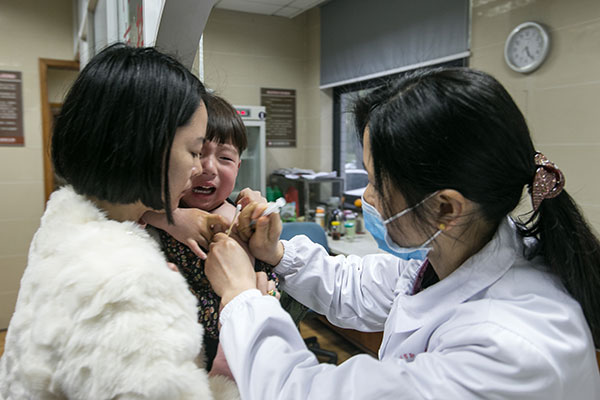Enforcement needed to plug health system loopholes
Updated: 2016-03-25 08:28
By He Jingwei(China Daily)
|
||||||||
 |
|
A patient receives rabies vaccine injection at Hangzhou hospital, March 22. [Photo/Agencies] |
The disclosure of a vaccine scandal has provoked a public health crisis in China. The authorities of East China's Shandong province revealed earlier this month the arrest of a mother and her daughter accused of trafficking expired or improperly refrigerated vaccines valued at $88 million. The vaccines, against rabies, meningitis, hepatitis B and other diseases, were illegally traded across 24 provinces, municipalities and autonomous regions since 2011.
Despite the World Health Organization's prompt statement that an adverse reaction to the vaccines is unlikely, this has done little to calm public outrage.
That's not surprising since the scandal has highlighted the loopholes in China's porous public health system and its weak management.
In particular, why did the local authorities not alert the public earlier, as the suspects were already arrested last year? This gives rise to legitimate suspicion of a bureaucratic cover-up of a health scare at the local level, a painful lesson the authorities should have learned not to do after the severe acute respiratory syndrome outbreak in 2003, which led to both the minister of health and mayor of Beijing stepping down.
Moreover, the widespread public fear comes from the fact that the illegal vaccine ring has been in operation for over four years, exposing big problems in the whole regulatory chain for vaccines in terms of acquisition, distribution and inoculation.
Numerous lessons from incidents both home and abroad, including the scandal of tainted milk powder not long ago, suggest how easy it is to destroy public confidence in a country's public health system and how difficult it is to restore it. The continued prosperity of massive cross-border smuggling of formula milk powder from Hong Kong to the mainland offers the best example. And there is a growing concern in the special administrative region that there will be excessive pressure on Hong Kong's health service as mainland residents may now flock there to get their children vaccinated. The authorities need to take measures to prevent this from happening.
Such health scandals rarely occur in Hong Kong, thanks to its well-established rule of law and strict quality assurance mechanisms exercised by both public and private health facilities. Even though a similar event on a much smaller scale and severity occurred three years ago in a public hospital in Hong Kong, the internal quality control mechanism of the hospital soon detected the irregularity and prompted follow-up remedies by the city's Hospital Authority and Health Protection Center, which brought the incident to an end in just two weeks.
Significant budgetary injections have been made into China's public health system since the traumatizing SARS crisis in 2003. The previously under-funded centers for disease control and prevention are now both well equipped and well staffed. And the central authorities have made immediate remedial efforts this time in ordering a thorough probe and keeping the public informed.
However, the scandal has shown that there has been little improvement in exercising transparency on the part of local governments when it comes to handling public health crises, even though all local governments are supposed to have enacted official protocols for managing them.
Even more important, the scandal has exposed the vulnerability of the country's public health system due to the lack of effective enforcement of the relevant regulations.
Enforcing regulations with bona fide adherence to the rule of law is arguably more crucial than introduction of more regulations or more investment in the system. This scandal has sounded an alarm.
The author is assistant professor of the Department of Asian and Policy Studies, Hong Kong Institute of Education.
- Global health entering new era: WHO chief
- Brazil's planning minister steps aside after recordings revelation
- Vietnam, US adopt joint statement on advancing comprehensive partnership
- European border closures 'inhumane': UN refugee agency
- Japan's foreign minister calls A-bombings extremely regrettable
- Fukushima impact unprecedented for oceans: US expert

 Stars of Lijiang River: Elderly brothers with white beards
Stars of Lijiang River: Elderly brothers with white beards
 Wealthy Chinese children paying money to learn British manners
Wealthy Chinese children paying money to learn British manners
 Military-style wedding: Fighter jets, grooms in dashing uniforms
Military-style wedding: Fighter jets, grooms in dashing uniforms
 Striking photos around the world: May 16 - May 22
Striking photos around the world: May 16 - May 22
 Robots help elderly in nursing home in east China
Robots help elderly in nursing home in east China
 Hanging in the air: Chongqing holds rescue drill
Hanging in the air: Chongqing holds rescue drill
 2.1-ton tofu finishes in two hours in central China
2.1-ton tofu finishes in two hours in central China
 Six things you may not know about Grain Buds
Six things you may not know about Grain Buds
Most Viewed
Editor's Picks

|

|

|

|

|

|
Today's Top News
Liang avoids jail in shooting death
China's finance minister addresses ratings downgrade
Duke alumni visit Chinese Embassy
Marriott unlikely to top Anbang offer for Starwood: Observers
Chinese biopharma debuts on Nasdaq
What ends Jeb Bush's White House hopes
Investigation for Nicolas's campaign
Will US-ASEAN meeting be good for region?
US Weekly

|

|









